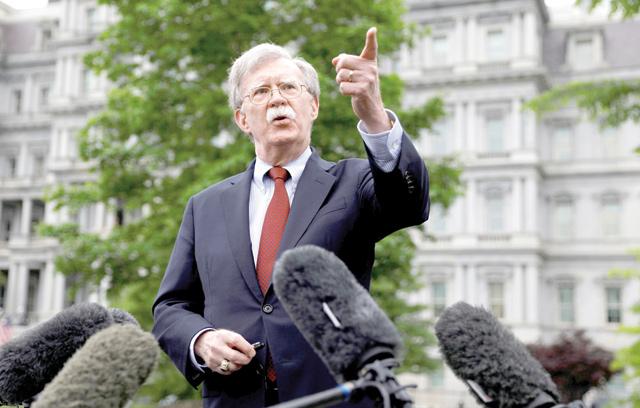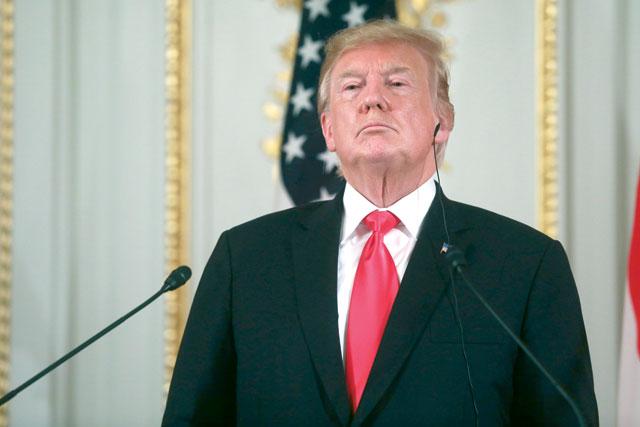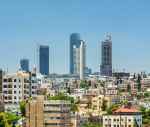You are here
Saudi Arabia says firm Arab stand needed to deter Iran
By Reuters - May 31,2019 - Last updated at May 31,2019
MECCA — Saudi Arabia's king told an emergency Arab summit on Thursday that decisive action was needed to stop Iranian "escalations" in the region following attacks on Gulf oil assets, as American officials said a US military deployment had deterred Tehran.
King Salman had opened an earlier meeting of Sunni Muslim Gulf leaders with a warning that Shiite Iran's development of nuclear and missile capabilities and its threatening of world oil supplies posed a risk to regional and global security.
"The absence of a firm deterrent stance against Iranian behaviour is what led to the escalation we see today," the ruler of the world's top oil exporter told the wider Arab gathering.
Saudi Arabia and the UAE, which have lobbied Washington to contain their foe, Shiite Muslim Iran, have said they want to avoid war after drone strikes on oil pumping stations in the kingdom and the sabotage of tankers off the UAE coast.
US Secretary of State Mike Pompeo said on Thursday that the attacks on the four vessels near a major bunkering hub, just outside the Strait of Hormuz, were "efforts by Iranians to raise the price of crude oil around the world."
Riyadh accused Tehran of ordering the drone strikes, which were claimed by Yemen's Iran-aligned Houthi group. US National Security Adviser John Bolton said on Thursday that evidence of Iran's being behind the tanker attacks would be presented to the UN Security Council as early as next week.
Tehran denies any involvement.
"The kingdom is keen to preserve the stability and security of the region, to spare it the scourge of war and to realise peace and stability," King Salman said, urging the global community to prevent Iran from "interfering" in Arab affairs.
Tensions have risen between the United States and Iran after Washington quit a multinational nuclear deal with Iran, reimposed sanctions and boosted its military presence in the Gulf.
Bolton has said that Iranian mines were "almost certainly" used in the tanker attacks, which he described as being connected to the strike on pumping stations on the kingdom's East-West Pipeline and a rocket attack on Baghdad's Green Zone.
An Iranian official dismissed Bolton's remarks as "a ludicrous claim". The Islamic republic has said it would defend itself against any military or economic aggression.
Iranian Vice President Eshaq Jahangiri has said Tehran was not allowed to pursue development of nuclear weapons as it was banned by Supreme Leader Ayatollah Ali Khamenei.
Deterring Iran
Bolton and the US special envoy for Iran, Brian Hook, told reporters on Thursday that a repositioning of US military assets in the region had succeeded in deterring Iran.
Bolton, speaking in London, said it would be a big mistake if Iran or its surrogates attacked US interests. Hook told a news conference call that the United States would respond with military force if that happens.
Last week the Pentagon announced the deployment of 900 additional troops to the region and extended the stay of 600 other service members, after speeding up deployment of an aircraft carrier strike group and sending bombers and additional Patriot missiles.
Egyptian President Abdel Fattah El Sisi told the summit that this month's attacks provided an impetus to renew discussions on joint Arab defence mechanisms.
The United States and the UAE, which hosts a US air base, on Wednesday activated a defence cooperation agreement signed earlier this year.
Gulf states have a joint defence force under the Gulf Cooperation Council (GCC), but the alliance has been fractured by a boycott imposed on Qatar by Saudi Arabia, the UAE, Bahrain and non-GCC Egypt since mid-2017.
Qatari Premier Abdullah Bin Nasser Al Thani, whose country hosts the largest US military base in the region, attended the summits, the most senior Qatari official to visit the kingdom since the embargo.
Iraq and Oman, which have good ties with Tehran and Washington, have said they are working to reduce tensions. Doha, which shares a giant gas field with Iran, has offered to help.
Related Articles
ABU DHABI — US National Security Advisor John Bolton said Wednesday that Iran was almost certainly behind oil tanker attacks that sent Gulf
TOKYO — US President Donald Trump said on Monday a deal with Iran on its nuclear programme was possible, crediting economic sanctions for cu
DUBAI/LONDON — Saudi Arabia said on Monday that two of its oil tankers were among those attacked off the coast of the United Arab Emirates a


















